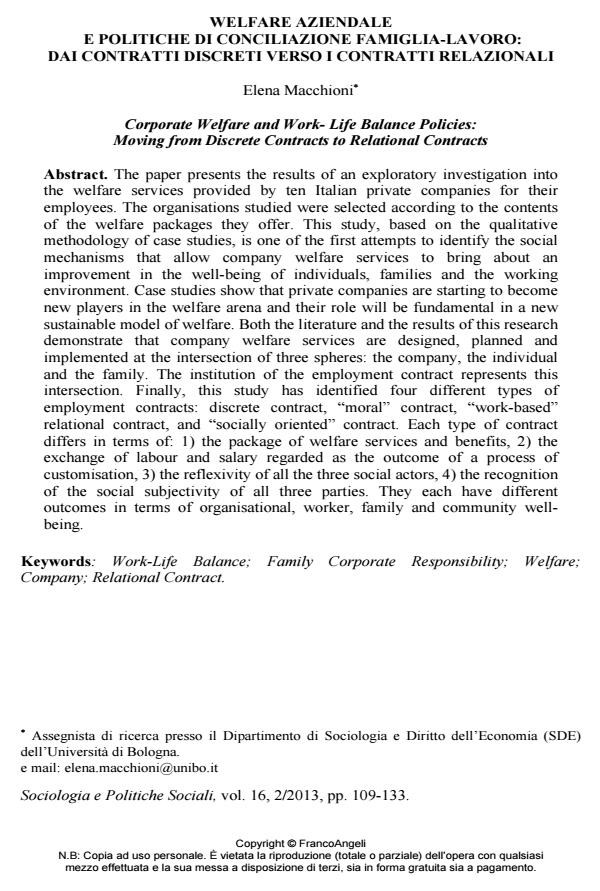Welfare aziendale e politiche di conciliazione famiglia-lavoro: dai contratti discreti verso i contratti relazionali
Journal title SOCIOLOGIA E POLITICHE SOCIALI
Author/s Elena Macchioni
Publishing Year 2013 Issue 2013/2
Language Italian Pages 25 P. 109-133 File size 713 KB
DOI 10.3280/SP2013-002006
DOI is like a bar code for intellectual property: to have more infomation
click here
Below, you can see the article first page
If you want to buy this article in PDF format, you can do it, following the instructions to buy download credits

FrancoAngeli is member of Publishers International Linking Association, Inc (PILA), a not-for-profit association which run the CrossRef service enabling links to and from online scholarly content.
The paper presents the results of an exploratory investigation into the welfare services provided by ten Italian private companies for their employees. The organisations studied were selected according to the contents of the welfare packages they offer. This study, based on the qualitative methodology of case studies, is one of the first attempts to identify the social mechanisms that allow company welfare services to bring about an improvement in the well-being of individuals, families and the working environment. Case studies show that private companies are starting to become new players in the welfare arena and their role will be fundamental in a new sustainable model of welfare. Both the literature and the results of this research demonstrate that company welfare services are designed, planned and implemented at the intersection of three spheres: the company, the individual and the family. The institution of the employment contract represents this intersection. Finally, this study has identified four different types of employment contracts: discrete contract, "moral" contract, "work-based" relational contract, and "socially oriented" contract. Each type of contract differs in terms of: 1) the package of welfare services and benefits, 2) the exchange of labour and salary regarded as the outcome of a process of customisation, 3) the reflexivity of all the three social actors, 4) the recognition of the social subjectivity of all three parties. They each have different outcomes in terms of organisational, worker, family and community wellbeing.
Keywords: Work-Life Balance; Family Corporate Responsibility; Welfare; Company; Relational Contract.
- Le politiche di conciliazione tra residualità e frammentarietà. Il caso di un co-working con spazio baby a Roma Giovanna Campanella, Luisa De Vita, in SOCIOLOGIA E POLITICHE SOCIALI 1/2018 pp.97
DOI: 10.3280/SP2018-001007 - Rethinking Work-Family Balance in Italy: Case Studies and Innovative Strategies Isabella Crespi, Melanie Sara Palermo, in Corvinus Journal of Sociology and Social Policy /2024 pp.103
DOI: 10.14267/CJSSP.2024.1.5
Elena Macchioni, Welfare aziendale e politiche di conciliazione famiglia-lavoro: dai contratti discreti verso i contratti relazionali in "SOCIOLOGIA E POLITICHE SOCIALI" 2/2013, pp 109-133, DOI: 10.3280/SP2013-002006